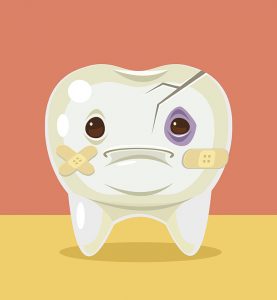What Does Grinding Teeth Do?
 As parents, we often look in on our sleeping children. We like to hear the sounds of them resting easy. However, sometimes we hear the sounds of gnashing and grinding teeth. Teeth grinding, also referred to as bruxism, is a common habit among children under eleven. Bruxism is so prevalent that it may even be considered a normal childhood behavior. But what does grinding teeth do? Does it affect your child’s development in any way? Well, it only rises to a level of concern when it leads to significant tooth wear or other issues.
As parents, we often look in on our sleeping children. We like to hear the sounds of them resting easy. However, sometimes we hear the sounds of gnashing and grinding teeth. Teeth grinding, also referred to as bruxism, is a common habit among children under eleven. Bruxism is so prevalent that it may even be considered a normal childhood behavior. But what does grinding teeth do? Does it affect your child’s development in any way? Well, it only rises to a level of concern when it leads to significant tooth wear or other issues.
What are some Facts about Bruxism?
- Bruxism is the medical term for the grinding of teeth or the clenching of jaws.
- Experts say that 2 to 3 out of every ten children will grind or clench their teeth.
- Most children outgrow bruxism.
- Bruxism usually happens during deep sleep phases.
- Bruxism can be an unconscious habit, meaning occurring without awareness, such as nail and cheek biting and non-nutritive sucking.
- Although a child may be taught to control or modify bruxism while awake, this may be impossible while the child is asleep.
What Causes Grinding of Teeth?
- Kids may grind or clench because their top and bottom teeth aren’t aligned properly.
- It may occur as a response to pain, such as an earache or teething.
- Stress, such as that caused by nervous tension, anger, excessive worry, or a change in routine may prompt bruxism.
- Children diagnosed with hyperactivity manifested through ADD or ADHD may also have bruxism.
- Other medical conditions, or medicines used to treat conditions, may result in bruxism.
- It can also be the result of sleep disorders like sleep apnea.
What are some of the effects of tooth grinding?
Tooth grinding is responsible for numerous health issues. Some of the effects include sore jaw, headaches, damage to tooth structure, loose teeth, and tooth sensitivity. If left undetected, advanced cases can result in cracked and broken teeth, TMJ Syndrome, or damage to the jaw structure.
How do I know if my child has developed Bruxism?
Many cases go undetected for years with no adverse effects. Determining the issue can be tricky because your child usually doesn’t even realize that she is doing it. The simplest way is to check in on your child at night to see if she is making grinding sounds in her sleep. Or, if multiple siblings share a room, ask them if their brother or sister makes grinding noises at night. Lastly, if your child complains of jaw soreness, or pain while chewing, you could suspect bruxism.
Is Bruxism Treatable?
Yes. If you suspect that your child is grinding her teeth, schedule a dental checkup. That way, your dentist can offer a proper diagnosis and recommend treatment. Your dentist may suggest a customized mouth guard be worn at night. Another solution is to use a battery powered toothbrush to discourage aggressive brushing. Further, your dentist may recommend further evaluation by an Ear, Nose, and Throat (ENT) specialist to address breathing issues. Finally, if you suspect your child is experiencing excessive stress, you may want to seek guidance from your pediatrician.
Concerned about your child grinding teeth at night? Contact Tooth Fairy Smiles today for an appointment. Our team will make sure to conduct a full evaluation and make suggestions for effective treatment.
Share